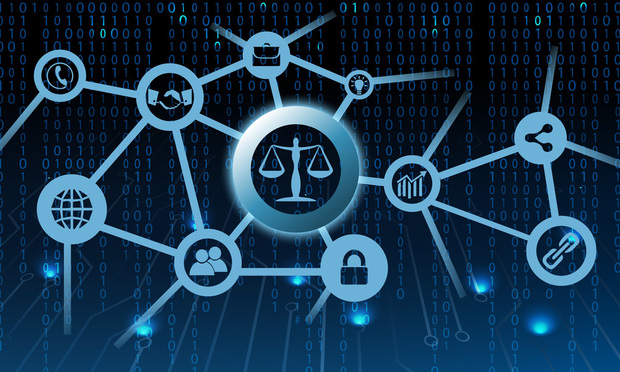How Technology Can Help Firms Prepare For a COVID-19 Future
It's no surprise that there has been a rapid uptick in investment to legal tech companies.
June 19, 2020 at 12:30 AM
5 minute read
 Legal tech was advancing before the pandemic but looks set to increase.
Legal tech was advancing before the pandemic but looks set to increase.
The COVID-19 pandemic has had an unprecedented impact on businesses of all sizes and across all sectors. In the legal sector, many firms were forced to move their operations from their corporate office to remote working in the space of just a few days.
As a result, what would have taken years of planning – proper project management, definition of objectives and risks, purchasing laptops and tablets, updating and enhancing IT security for remote working, moving to cloud-based solutions – took place across an entire industry in just a matter of weeks.
But the legal industry's evolving use of tech was well-advanced even before Covid-19 induced lockdowns, and it's not only remote working technologies that need to be considered. Workflow management platforms were in widespread use years before the global pandemic sparked broader conversations about the future of work, leaving many law firms to ponder how they can best pursue – and accelerate – their plans for digital transformation.
Fortunately, the legal industry has a rich legal technology sector that can help to modernise and increase efficiency in casework, contract management, and security, to name a few. While most large law firms are well-equipped to deal with the changes that will be needed to cope with Covid-19, the least technology savvy – the medium and small sized firms, plus chambers and other more traditional areas of the legal market – will need to embrace these technologies very quickly.
Some technology solutions are provided by new market entrants who are intent on disrupting long-established business models, and others by incumbent legal services providers who are transforming their operations to maintain profitability and relevance. Some have even been incubated within law firms themselves.
While some aspects of the legal industry are highly bespoke, many tasks are fairly repetitive: technology can drive efficiency and automation in these areas. Rapid advancements in AI, machine learning, and NLP have accelerated this shift. Combined with greater data processing power, this means that legal tech solutions are increasingly carrying out aspects of the routine tasks previously performed by paralegals and junior lawyers, such as contract drafting, legal research, and contract review. The move of many solutions to the cloud has also made the deployment of solutions easier, bypassing law firms' lack of internal tech expertise.
The value that legal tech can offer goes far beyond basic administrative tasks, however. Over the years, there has been a significant rise in the number of documents lawyers must review for their clients, as well as a growing compliance burden from external factors such as regulatory change (e.g. MiFID II and GDPR). When it comes to gathering case evidence in legal disputes, for example, the growth of email volume has exponentially increased law firms' review requirements, leading to increasingly sophisticated predictive and prescriptive e-discovery solutions.
At the same time, the electronic delivery of core service propositions, provided through web-based platforms and mobile apps, not only improves service quality, but also drives down prices through cost efficiencies. This change is being accelerated by the increasing client resistance to billing by the hour (and the perception that this incentivises inefficiency) and the push for fixed fee or other alternative pricing arrangements – which encourage greater efficiency in the firm's own operations.
Some solutions, for example, might negate the need to provide basic client updates via phone or email, which can be both time-consuming and costly. As a result, these solutions can simultaneously help to drive cost efficiencies, reduce human error and free up highly-trained employees to focus on the activity most valued by their clients: applying human knowledge and judgement.
The day-to-day applications of legal tech represent only half the story, however. In the post-Covid-19 environment, firms will also need to rethink how physical courts will operate and consider the repercussions of social distancing and travel restrictions. Without a doubt, new solutions will emerge to address these areas as well.
In fact, Cloisters Chambers is already running a pilot initiative using remote video conferencing to deliver multi-party settlement meetings and mediations. In reality, the pandemic has eradicated much of the scepticism surrounding video conferencing, so if pilots like these are successful, we will no doubt see other firms follow suit.
With so many benefits on offer, it's no surprise that there has been a rapid uptick in investment to legal tech companies. Even before the pandemic, investment in legal technology had jumped in the last few years, with start-ups receiving £61m in investment in 2018 compared to just £2.5m in 2016. As a result, the UK is quickly becoming a significant legal technology hub, with 44% of all legal tech start-ups across Europe now based in Britain.
Moreover, as the legal tech market continues to mature, technology is likely to become an increasingly important catalyst for deals within the UK legal services market, as well as a critical enabler for successful completion and post-acquisition integration.
For all these reasons, the legal tech sector will be one to watch in the months and years ahead – not only for investors, but also for the firms that can use this technology to adapt their services to this 'new normal' whilst also reducing costs. For these firms, the message is clear: legal technology will not only enable them to survive in the post-Covid-19 landscape, but also to thrive.
Daniel Domberger is managing director at Arrowpoint Advisory
This content has been archived. It is available through our partners, LexisNexis® and Bloomberg Law.
To view this content, please continue to their sites.
Not a Lexis Subscriber?
Subscribe Now
Not a Bloomberg Law Subscriber?
Subscribe Now
NOT FOR REPRINT
© 2025 ALM Global, LLC, All Rights Reserved. Request academic re-use from www.copyright.com. All other uses, submit a request to [email protected]. For more information visit Asset & Logo Licensing.
You Might Like
View All

Pallas Partners Founder On the Disputes Trends to Look Out For in 2025
4 minute read
What to Expect From Teresa Ribera, the EU‘s New Competition Commissioner
6 minute readTrending Stories
- 1Uber Files RICO Suit Against Plaintiff-Side Firms Alleging Fraudulent Injury Claims
- 2The Law Firm Disrupted: Scrutinizing the Elephant More Than the Mouse
- 3Inherent Diminished Value Damages Unavailable to 3rd-Party Claimants, Court Says
- 4Pa. Defense Firm Sued by Client Over Ex-Eagles Player's $43.5M Med Mal Win
- 5Losses Mount at Morris Manning, but Departing Ex-Chair Stays Bullish About His Old Firm's Future
Who Got The Work
J. Brugh Lower of Gibbons has entered an appearance for industrial equipment supplier Devco Corporation in a pending trademark infringement lawsuit. The suit, accusing the defendant of selling knock-off Graco products, was filed Dec. 18 in New Jersey District Court by Rivkin Radler on behalf of Graco Inc. and Graco Minnesota. The case, assigned to U.S. District Judge Zahid N. Quraishi, is 3:24-cv-11294, Graco Inc. et al v. Devco Corporation.
Who Got The Work
Rebecca Maller-Stein and Kent A. Yalowitz of Arnold & Porter Kaye Scholer have entered their appearances for Hanaco Venture Capital and its executives, Lior Prosor and David Frankel, in a pending securities lawsuit. The action, filed on Dec. 24 in New York Southern District Court by Zell, Aron & Co. on behalf of Goldeneye Advisors, accuses the defendants of negligently and fraudulently managing the plaintiff's $1 million investment. The case, assigned to U.S. District Judge Vernon S. Broderick, is 1:24-cv-09918, Goldeneye Advisors, LLC v. Hanaco Venture Capital, Ltd. et al.
Who Got The Work
Attorneys from A&O Shearman has stepped in as defense counsel for Toronto-Dominion Bank and other defendants in a pending securities class action. The suit, filed Dec. 11 in New York Southern District Court by Bleichmar Fonti & Auld, accuses the defendants of concealing the bank's 'pervasive' deficiencies in regards to its compliance with the Bank Secrecy Act and the quality of its anti-money laundering controls. The case, assigned to U.S. District Judge Arun Subramanian, is 1:24-cv-09445, Gonzalez v. The Toronto-Dominion Bank et al.
Who Got The Work
Crown Castle International, a Pennsylvania company providing shared communications infrastructure, has turned to Luke D. Wolf of Gordon Rees Scully Mansukhani to fend off a pending breach-of-contract lawsuit. The court action, filed Nov. 25 in Michigan Eastern District Court by Hooper Hathaway PC on behalf of The Town Residences LLC, accuses Crown Castle of failing to transfer approximately $30,000 in utility payments from T-Mobile in breach of a roof-top lease and assignment agreement. The case, assigned to U.S. District Judge Susan K. Declercq, is 2:24-cv-13131, The Town Residences LLC v. T-Mobile US, Inc. et al.
Who Got The Work
Wilfred P. Coronato and Daniel M. Schwartz of McCarter & English have stepped in as defense counsel to Electrolux Home Products Inc. in a pending product liability lawsuit. The court action, filed Nov. 26 in New York Eastern District Court by Poulos Lopiccolo PC and Nagel Rice LLP on behalf of David Stern, alleges that the defendant's refrigerators’ drawers and shelving repeatedly break and fall apart within months after purchase. The case, assigned to U.S. District Judge Joan M. Azrack, is 2:24-cv-08204, Stern v. Electrolux Home Products, Inc.
Featured Firms
Law Offices of Gary Martin Hays & Associates, P.C.
(470) 294-1674
Law Offices of Mark E. Salomone
(857) 444-6468
Smith & Hassler
(713) 739-1250









